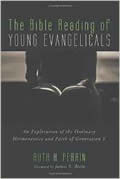Data for Discipleship Research is drawn from the following research projects:
An Observation and Analysis of Ordinary Bible Reading among British Evangelical Emerging Adults (2015)
Author: Ruth Perrin
Qualification & date: PhD, Department of Theology & Religion, Durham University. 2015
Abstract: This study contributes to the under-researched field of how ‘ordinary’ British Christians engage with their Scriptures. It examines the Bible reading habits of young evangelicals and explores how these shape their ability to engage contentious themes within the text. It also examines attitudes towards gender and, following Arnett’s model of ‘emerging adulthood’, traces patterns of faith development, comparing evangelical belief with wider findings on emerging adult religiosity.
Findings are based on a qualitative research project undertaken with emerging adults from three churches that span the evangelical tradition: egalitarian charismatics, mainstream evangelicals and Reformed neo-conservatives. In each church three mixed-gender focus groups were run, comprised of cohorts aged 18-22, 23-26 and 27-33. All nine groups read and freely discussed three biblical narratives: 2 Kings 5, 1 Samuel 25 and Acts 12. These were chosen for their relative unfamiliarity and the contested theological issues they raise: divine violence, supernaturalism and issues of gender. Discussions were examined in light of the official doctrinal positions of their churches and the expectations their leaders expressed. They were also compared across theological tradition and age range.
This project presents a new methodology for comparative exploration of beliefs and challenges assumptions about the faith of emerging adults. It provides nuanced findings on the dynamic relationship young British evangelicals have with their faith and Scriptures.
Publication: The findings were used in a Doctoral thesis and subsequently published as the Bible Reading of Young Evangelicals (Wipf & Stock, 2016).
How might the evangelical church use neglected, female, biblical role models as a method of discipleship and empowerment among young women? (2007)
Author: Ruth Perrin
Qualification & date: Master’s Degree in Theology & Ministry, Durham University. 2007
Abstract: Faith development and spiritual growth in the Judeo-Christian traditions have historically used a rabbinical or ‘role model’ method of discipleship. In the Evangelical Church this has typically involved teaching about biblical characters as examples of faith in action. This has tended to focus on specific characters, typically male, leaders of some sort, and primary to the narrative. Generally selected and taught by male leaders, this imbalance of attention has left many without suitable role models to inspire their own faith journey.
In selecting role models, points of empathy or affinity are vital, particularly to groups who feel overlooked or disadvantaged. That ‘someone like me can do that’ is a powerful motivator to increase faith, confidence and subsequently modify behaviour. Data collected from questionnaires completed by 50 women aged 18-30 in northern England clearly showed that they actively looked for female role models, even when they were scarce. However when asked to select biblical role models many cited male characters, expressing regret that they knew, and had been taught so little about positive biblical women.
This suggests that many of the scriptural role models typically presented in the evangelical church have limited value for the faith development and maturity of young women. The Bible contains many positive, inspirational, secondary characters of both genders, which might help to motivate, challenge, and encourage young women. The need to present relevant role models and increase biblical literacy is an urgent challenge to those responsible for faith development and biblical education within the Evangelical Church. This paper considers and suggests some possible approaches to meet this challenge.
Publication: Data was analysed and findings were used in an MA thesis (achieving distinction) and published as Inspiring Women, Discovering Biblical Role Models (Grove, Biblical Series 42, 2009) and “Searching for Sisters” in The Faith Lives of Women and Girls, edited N. Slee et al, (Ashgate, 2013).


